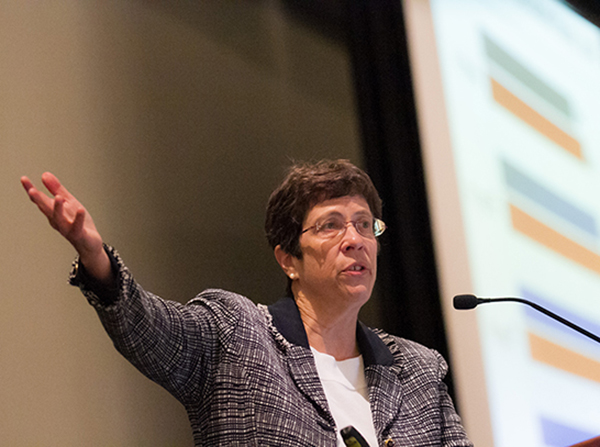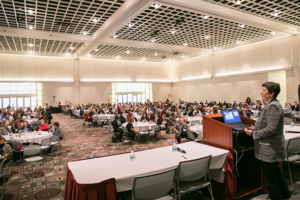
Laura Mosqueda is the keynote speaker during the 2nd Annual Older Adult Summit, held April 5 in Pasadena. (Photo/Ricardo Carrasco III)
In the battle to change the public’s perception of aging, Laura Mosqueda, MD, is a strong advocate for toppling some common myths about aging: that older adults are frail, sickly and withdrawn.
“Ageism is really pervasive in our society but when you stop to think about what ageism really is, it’s a prejudice against our future selves and it makes no sense,” said Mosqueda, interim dean of the Keck School of Medicine of USC and director of the National Center on Elder Abuse.
Instead, the public should embrace the idea of aging and strive to ensure the well-being of older adults around them, she said.
“Optimal aging is the idea that despite the fact that most of us are going to have some chronic conditions as we age, we want to live life to our best,” Mosqueda said. “And I always feel like my job as a geriatrician is to help my patients be their best, whatever their circumstances.”

2nd Annual Older Adult Summit. “Aging with a Purpose… “Enhancing the lives of Older Adults through Empowerment, Engagement, and Active Living”. Key Note Speaker: Dr. Laura Mosqueda.
Mosqueda discussed these topics and more as the keynote speaker at the 2nd Annual Older Adult Summit, held April 5 in Pasadena. With a theme of “Aging with a Purpose,” the event was aimed at “enhancing the lives of older adults through empowerment, engagement and active living.” Purposeful Aging Los Angeles, an initiative launched by Los Angeles city and county officials, as well as private organizations including the USC Leonard Davis School of Gerontology, organized the event, which had more than 900 attendees. The day included sessions for older adults and caretakers on brain health, property taxes, healthy living, Medicare rights and recognizing scams.
While nearly a third of our health and wellness can be attributed to the genetic “lottery,” 40 percent is due to behavior. Social engagement, for example, is critically important as we age, Mosqueda explained, helping prevent memory loss, providing a sense of community and giving older adults a sense of purpose.
“People who report higher levels of purpose at a particular point in time, four years later are more healthy than people who don’t report a sense of purpose,” she said, adding that she often talks to her patients about purpose in helping think through medical decisions.
It is also vital for older adults to remain active in their community — not just with transportation, but also by having safe, affordable housing and social services. “It’s really easy for me to tell a patient they ought to get out and exercise, but if they’re afraid of getting mugged in their own neighborhood, then that’s a very hard thing to do,” she said.
Mosqueda lauded the city and county’s efforts at creating an aging-friendly city, as well as launching initiatives that are designed to support and empower older adults.
“Remember that old age is a treat; our ancestors did not have the opportunity to age as we have now,” Mosqueda said. “Living beyond the time needed for reproducing is actually a luxury.”
— Melissa Masatani